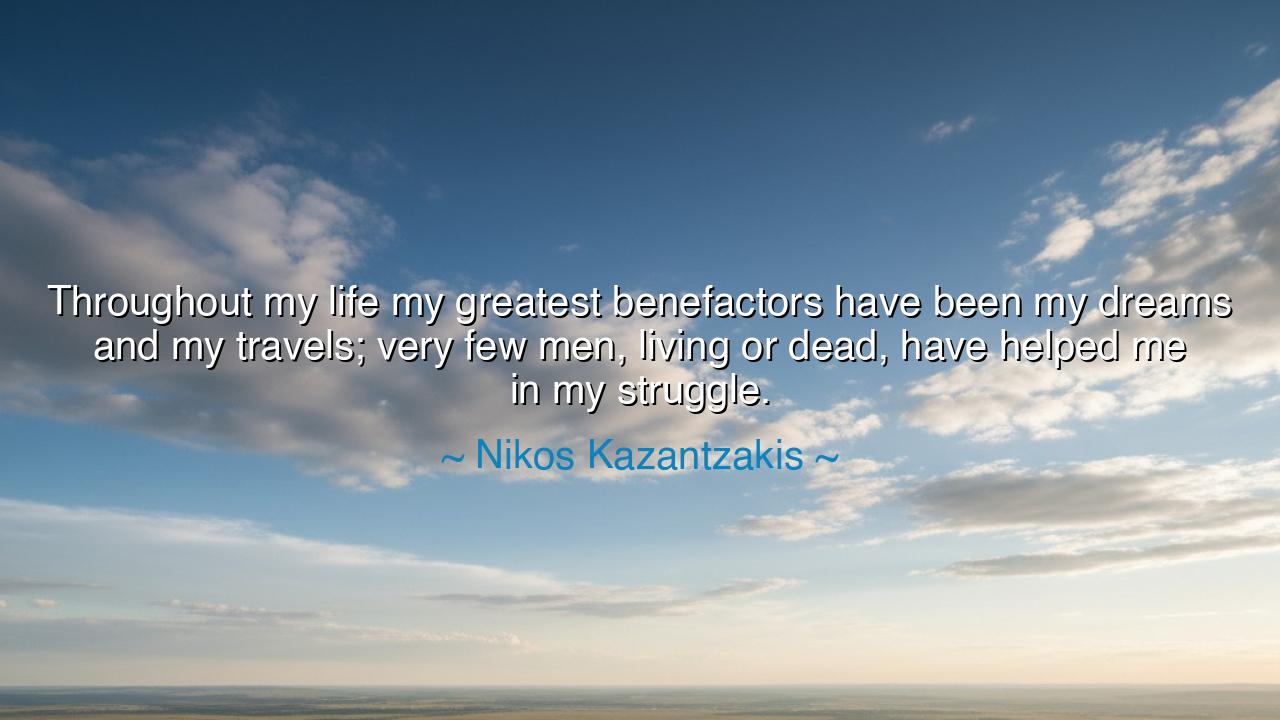
Throughout my life my greatest benefactors have been my dreams
Throughout my life my greatest benefactors have been my dreams and my travels; very few men, living or dead, have helped me in my struggle.






The words of Nikos Kazantzakis, wanderer of the spirit and poet of freedom, resound with the gravity of a life lived in fierce pursuit of truth: “Throughout my life my greatest benefactors have been my dreams and my travels; very few men, living or dead, have helped me in my struggle.” In this confession lies both solitude and triumph — the song of a man who found his teachers not in institutions or masters, but in experience itself. The dreams he carried within and the journeys he undertook across the world were the twin pillars of his becoming. From them, he learned what no mentor could teach: that the road itself is a sacred text, and the soul’s vision its only compass.
Kazantzakis was born in Crete, a land shaped by rebellion and myth, where gods and freedom fighters seemed to share the same blood. His life was marked by restlessness — a pilgrimage through countries, philosophies, and faiths. He studied under the philosopher Henri Bergson in Paris, walked the streets of Moscow during revolution, and wandered the monastic cliffs of Mount Athos in search of God. Yet in all these places, he found no single truth — only fragments, glimpses, the fleeting whisper of eternity. It was through travel that he came to understand humanity’s vastness, and through dream that he learned to interpret its meaning. He realized that wisdom does not dwell in comfort, but in motion — in the perpetual reaching toward what lies beyond.
When he speaks of benefactors, Kazantzakis turns the meaning of the word upside down. Most men receive guidance from teachers, fortune, or family — but he found his benefactors in the unknown. The dream, for him, was the inner voyage — the vision of what might be, the sacred fire that urged him beyond the borders of ordinary life. And travel was its outward mirror — the act of casting himself into the winds of the world, to test his soul against the vastness of creation. Together, these two gave him what others could not: awakening. For the dream without the journey is fantasy, and the journey without the dream is wandering. But when united, they form the alchemy of transformation.
Consider the life of Odysseus, hero of Homer’s epic, whom Kazantzakis admired above all. After Troy’s fall, Odysseus wandered the seas not merely by chance, but by destiny. His voyages tested every fiber of his being — through temptation, loss, and storm. Yet it was not the gods nor his companions who were his greatest benefactors; it was the journey itself, and the dream that drove him to see Ithaca again. Through hardship, he learned wisdom; through wandering, he found his soul. So too did Kazantzakis live as a modern Odysseus — his Ithaca was not a place, but the endless quest for meaning.
And when he says, “very few men, living or dead, have helped me in my struggle,” he does not speak in bitterness, but in liberation. For he understood that the path of the seeker is lonely by necessity. Those who hunger for truth must often walk alone, carrying the weight of their vision through deserts of doubt and misunderstanding. The great souls of the world — prophets, poets, explorers — all have shared this solitude. It is the price of freedom. Yet Kazantzakis teaches that loneliness need not be despair; it is the crucible in which individual strength is forged. To rely too heavily on others is to weaken the inner voice. The true benefactor, he tells us, is the spirit’s own yearning.
From this understanding flows a lesson as timeless as the mountains and seas he crossed: that one must seek growth not in comfort, but in motion — not in inheritance, but in experience. The world itself is the greatest teacher, and dreams are the scriptures written upon the heart. Travel — not merely in distance, but in thought, in courage, in compassion — expands the soul beyond the narrow limits of self. And dream — not as escape, but as vision — gives direction to that expansion. Together, they lead a person toward the highest form of life: self-creation.
So, O traveler of tomorrow, remember Kazantzakis’s wisdom. When others abandon you, when paths twist into uncertainty, turn to your dreams and your journeys, for they will never betray you. Go forth into the unknown with a fearless heart. Let every mountain teach you humility, every sea remind you of vastness, every city mirror your own restlessness. Walk as one who knows that struggle is sacred, for it chisels the soul into its truest form. In the end, you will find — as Kazantzakis did — that the world itself, in all its chaos and wonder, was your greatest benefactor, and your own dreams the truest guides to your destiny.






AAdministratorAdministrator
Welcome, honored guests. Please leave a comment, we will respond soon